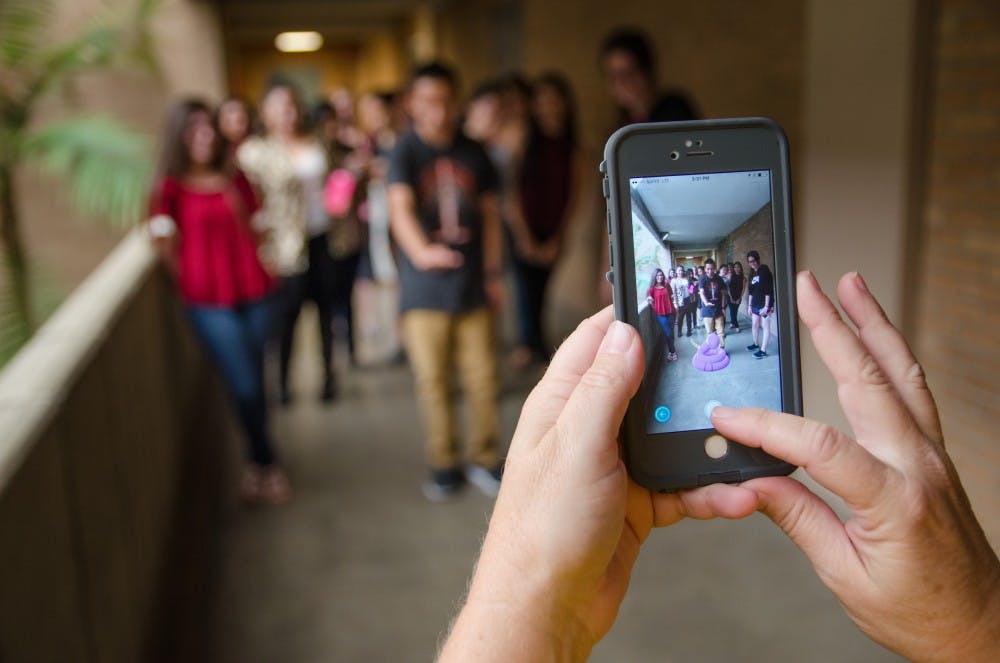Video games — a practice commonly involving sitting back in an uncomfortable chair in the darkness of a college dorm room staring at a TV screen to control imaginary characters — is perpetually rising in popularity.
A report from Fortune estimates the video game industry brought in $23.5 billion in 2015 in the U.S. alone.
With technology upgrading at a rapid pace, there are faculty and students at ASU who are contemplating the implementation of video games in classrooms.
Karen Guerrero, a clinical assistant professor at the Mary Lou Fulton Teachers College who also works with the Arizona Geography Alliance, recently worked on a program designed for middle school students that incorporated the mobile game Pokémon Go into the curriculum.
Guerrero said the lessons use data obtained from the game to teach aspects of math, while the mapping technology is used to teach geography.
She said the students are tasked with collecting various data points that are unique to the game, like where to find certain types of Pokémon, how their point values vary, and differences in rarity.
Guerrero also said she also hopes to toy with the ideas of leveling up and earning badges, and that there were so many other features of Pokémon Go that got her to think about how games will affect teaching.
“I saw the potential in how it is really going to change gaming in the future," she said. "It’s going to change the way we use technology.”
Guerrero said there is actually a whole department dedicated to figuring out how to incorporate gaming in classrooms.
However, the program Guerrero worked on was only developed for 6th graders and will start piloting in 8th grade classrooms in the spring. That has stopped the program itself from actually being used in ASU classrooms, other than at the Mary Lou Fulton Teachers College where the students are being taught to use the program and create their own lessons with it.
Gaming in the classrooms may be on hold, but students have voiced their interest in developing the idea.
How video games like Minecraft can help your child in the classroom - https://t.co/rzvXMlB2Ja https://t.co/FoNZQjD2Kz
— iTeach (@iteach_uk) August 31, 2016
Wesley Ashton, an economics freshman, said he would be interested in seeing games enter the learning environment, but there are some challenges to bringing the ideas together.
“Whoever makes the game really has to make it to where it can compare with games kids play for fun,” he said.
There is a challenge with using the popular gaming ideas presented in Call of Duty or Grand Theft Auto because of the amount of violence used in the games. According to PBS the greatest health risk to children and adolescents is violence, and in those games the majority of the purpose is to preform violent actions.
Austin Davison, finance freshman, said children learn valuable things from certain video games, despite the violence being presented in them.
“Kids have learned history from Call of Duty games," he said. "Grand Theft Auto takes you through situations you might not have experienced.”
Beyond the problem of the sometimes inappropriate content in popular games there is difficulty in trying to make video games relevant to certain college majors.
Ashton and Davison said they don’t really see how video games could be used within their respective majors of economics and finance.
Ashton also said he can’t really imagine games for general education courses such as math and English.
While learning may not always be the most intriguing task, video games seem to be catching significant attention of college students, a study from Pew Internet Research found that 70 percent of college students play video games.
Ashton said that even if video games can’t be incorporated on a day-to-day basis in teaching there should still be an emphasis on teaching in games.
"As a community, a population, whoever makes the video games should make them to make kids smarter," he said.
Reach the reporter at atotri@asu.edu or follow @AnthonyTotri56 on Twitter.
Like The State Press on Facebook and follow @statepress on Twitter.




